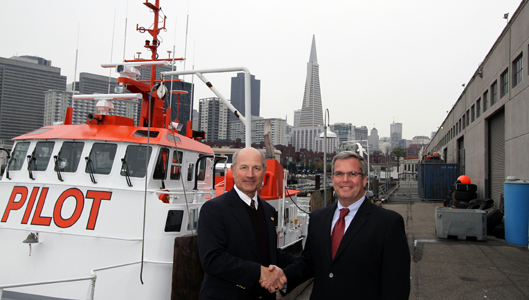The San Francisco Bar Pilots Association (SFBPA) is renewing and strengthening its long-standing support for the California Maritime Academy with a combination of scholarships and support for enhanced recruitment efforts totaling over $75,000.

The San Francisco Bar Pilots Association announced a series of commitments to strengthen the California Maritime Academy last month.
By Patrick Burnson
Published: January, 2010
The San Francisco Bar Pilots Association (SFBPA) is renewing and strengthening its long-standing support for the California Maritime Academy with a combination of scholarships and support for enhanced recruitment efforts totaling over $75,000.
Captain Peter McIsaac, SFBPA’s president, said his organization has formalized a five-year commitment to the Academy to underwrite four annually-renewable $2,500 scholarships for cadets pursuing a bachelor’s degree and licensure as a qualified deck officer. The organization also made a five-year commitment to assist Cal Maritime’s Center for Excellence and Learning in its efforts to recruit educationally and economically disadvantaged students.
“A majority of our pilots are graduates of the California Maritime Academy and we appreciate the Academy’s contribution and service to the maritime industry,” said McIsaac. “The Academy’s curriculum and training help prepare students for a lifetime at the helm, on the bridge and at sea. We are proud to do our part and support the Academy’s mission in creating the next generation of global mariners.”
William B. Eisenhardt, Cal Maritime’s president, expressed his deep thanks to the pilots for their ongoing support of the Academy—one of seven U.S. maritime academies and the only one on the West Coast. “Our ties to the piloting profession are long and deep along the Pacific Rim,” he noted. “Nearly one-third of all the pilots currently guiding ships in and out of ports from southern California to Seattle, Alaska and Hawaii are Cal Maritime graduates. For the San Francisco Bar Pilots organization, it’s almost two-thirds. Many of today’s pilots were able to complete their educations only because of the scholarship help they got when they were in school.”
“They understand how important and valuable it is to have assistance like this, which allows students to concentrate on their studies and not worry how they will pay for them,” Eisenhardt said. “The piloting profession is critical to the economy of California and the nation, as over half of all the international trade goods moving in and out of the country transit West Coast ports. The pilot’s skills and knowledge of local ports and harbors are vital to the safe passage of these vessels and their cargoes. We are pleased to see our ties with SFBPA extended and strengthened through their generous support and commitment to the school and to our students.”
Ugly Media Rumors
This very positive news comes about just when rumors surfaced in the mainstream media about the imminent demise of the marine transportation (MT) major program at Cal Maritime. According to Cal Maritime, however, the rumors are untrue; spokesmen said that the MT major program is “thriving” and there are no plans for its closure.
“State budget cuts to the university system have had a significant impact on Cal Maritime, including twice-a-month unpaid furloughs for most faculty and staff, and freezes on hiring, travel and significant purchases,” said spokesmen. “However, our prime focus in responding to the challenge has been on sustaining the quality of our programs for our students and that we are continuing to do.”
Indeed, said spokesmen, MT is strong and continues to be the most popular major at the Academy, along with marine engineering, mechanical engineering, facilities engineering, international business and logistics, and global studies and maritime affairs.
APL Brings Cleaner Ships to Oakland
APL may no longer be headquartered here, but it is using the Bay Area to announce a major “green” initiative. APL used the Port of Oakland as a backdrop to usher in news that it had teamed with the Bay Area Air Quality Management District on a “landmark” $11 million project to cut vessel emissions and improve air quality starting in 2010.
Armed with $4.8 million in air quality grants, the world’s fifth-largest container carrier said it will retrofit its terminal and vessels to begin cold-ironing next December at the Port of Oakland. Cold-ironing—turning off a ship’s 2,000-horsepower diesel generators at berth and connecting instead to electrical sources ashore—enables vessels to maintain power in port while eliminating exhaust emissions. Cold-ironing is considered one of the most effective ways to improve coastal air quality.
Like many other major container lines, APL is ahead of the curve in meeting international environmental compliance standards. Regulations mandating cold-ironing in California take effect in 2014, but APL plans to begin three years sooner.

